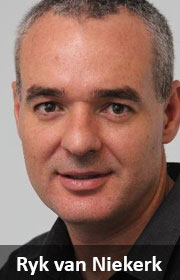 The cellular industry may soon become the victim of the next wave of disruptive technology, much as this industry virtually destroyed traditional fixed-line telephony in the late 1990s.
The cellular industry may soon become the victim of the next wave of disruptive technology, much as this industry virtually destroyed traditional fixed-line telephony in the late 1990s.
This may happen sooner than many think. The mobile operators’ current business models are not adapting fast enough to counter new technology, while their arrogance will drive away customers when new and cheaper communication solutions inevitably emerge.
This perspective flows from a very “unfortunate” event which caused me to reflect on the business models of the local mobile networks.
On a leisurely Saturday afternoon a few weeks ago, my son pinched my cellphone and proceeded to watch YouTube videos. A full 1,8GB later, of which a substantial portion was “out of bundle”, I gawked at the SMS “alerting” me to the 400 out-of-bundle megabytes my son had used.
At R2/MB, my Saturday afternoon was ruined — not because I was R800 out of pocket, but because I had that peevish feeling that I was being exploited as I had forfeited around a gigabyte of unused data the previous month. (It didn’t help that the call centre operative sniggered at my predicament.)
Ironically, this happened during the same week a new a 300GB, 100Mbit/s fibre connection was activated at my house … for R750 a month!
This disconnect between the value perception of the two services is startling. They are so out of kilter that they influence the way in which I use them, although they essentially offer the same service. The fibre service allows me to use broadband as much as I want at a very affordable rate, while I use the mobile service as little as possible fearing another penalty.
I regard myself as a typical contract user who is not too price sensitive. I do not mind paying more for a reliable service, but I most definitely don’t want to feel that I am being exploited.
No one does, not even Warren Buffet.
This blatant disconnect in pricing models may be one of the key reasons why mobile operators should be concerned. The value perception of mobile convenience is quickly disappearing. Many new technologies and applications have and will continue to emerge that will disrupt these high-margin services.
Over-the-top technologies such as WhatsApp and Skype are becoming preferred communication products, mostly because they are virtually free in comparison to traditional mobile pricing models.
WhatsApp has already virtually destroyed the networks’ high-margin SMS services and, with a bit more handset integration, WhatsApp and Skype will seriously dent the operators’ voice revenue.
It is therefore not a surprise that MTN and Vodacom recently argued in parliament that these services must be regulated.
The mobile operators have one significant competitive advantage, and that is the convenience of mobile access. This advantage is, however, disappearing as the availability of other services, such as my 300GB fibre service, changes user behaviour.
Mobile subscribers may adapt their behaviour to use the mobile service as a last resort and rather wait to phone and browse the Web when they enter a Wi-Fi zone. (I will in future never make a cellphone call from my house again, a scenario in which my mobile network will not even receive data revenue.)

Although this migration will not happen overnight, this behavioural change will accelerate, and when a disruptive technology emerges to “circumvent” the expensive mobile convenience advantage of the mobile networks, there will be a swift and brutal migration. Think Model T and the horse trade.
Isn’t it ironic how history repeats itself? Back in the 1990s, Telkom was the dominant player and the big bully that controlled the market. Telkom was protected by draconian regulations and MTN and Vodacom entered the market as niche players. Telkom was always quick to complain to the regulator when these young disruptors conjured up innovative solutions.
But to their credit, these two players seized the opportunities when the market was partially deregulated and they managed to drop their pricing aggressively.
Unfortunately, over the next two decades, these innovative operators transformed into less nimble and fat cash cows. I am sure these networks will disagree.
The question is not only how the big mobile operators will react to these technology changes. I am sure they have their strategies, but they should not alienate their clients in the way I have been. Arrogance makes the fall much harder.
- Ryk van Niekerk is editor of Moneyweb. This column was first published on Moneyweb and is used here with permission

